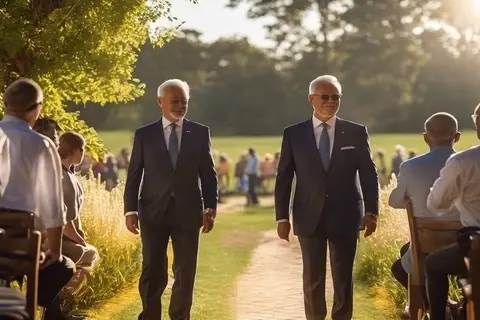Trust is Built, Not Given: Actions Speak Louder
Discover why trust is truly built, not given. Learn actionable steps to strengthen trust through consistent actions and reliability.

Trust is built, not given, through consistent actions and transparent communications delivered consistently over time. Trust is earned in the little things, in the tangible ways people keep their promises and show up when it counts. A true friend listens and takes action.
A true leader has the back of their team, and an authentic brand delivers on their promise. Each one contributes to building trust gradually. Grand promises don't hold water and flow away, but a small gesture can go a long way.
In personal life or professional practice, trust is built when individuals are equitable and authentic. While for most, building trust is an arduous journey, every step taken gets individuals that much closer.
Coming soon, how trust is built through genuine experiences.
" Trust is built—through consistent, transparent behavior over the long term. "
Key Takeaways
- Trust is built—through consistent, transparent behavior over the long term. Trust is not simply given because they are an agency or because they say so.
- Building trust starts with transparency and clear communications. It requires honoring commitments, which in turn lead to a climate of safety that fosters more meaningful relationships.
- Healthy trust is not the same as blind faith. That takes deliberate cultivation, thoughtful practice, deep listening, introspection, and an openness to learn from what has worked and what has failed in the past.
- Empathy, vulnerability, and sharing authentic experiences are the magic ingredients for cultivating deep trust — from personal relationships to business partnerships to online communities.
- Cultural awareness and sensitivity play a role in how individuals give and receive trust. By understanding these contrasts, we can develop deeper, more equitable trust.
- When trust has been broken, rebuilding it takes time and steady effort. Though this process can be painful, it can lead to deeper connections and healing.

What Does Trust Mean?
Trust is not built overnight. It builds inch by inch, guided by the actions of the people involved rather than simply the rhetoric they spout. At its most fundamental level, trust means relying on someone to fulfill their commitments.
It includes holding them to the highest standards of truthfulness in their actions. It's the calm, dependable soil in which deep friendships, effective workgroups, or even partnerships between nations take root. When someone proves they keep their word, others start to lean in, feeling safe to open up and share more of themselves.
More Than Just Belief
Trust is indeed about more than just belief in someone's goodwill. It comes from the small things: showing up on time, keeping a secret, or lending a hand when it matters.
In Europe, for instance, researchers examine the proportion of people who agree with the statement "most people can be trusted." These numbers underscore the notion that trust is built through lived experiences rather than wishful thinking.
Emotional intelligence is just as important. Individuals are susceptible to cues—whether it's tone of voice, body language, or something else entirely—to determine whether trust is warranted or not.
Earned, Not Automatic
Trust is not something anyone is entitled to immediately. It's not automatic; instead, it's earned, piece by piece, each time a person is truthful and trustworthy.
Trust is earned with each promise fulfilled and each truth spoken. Imagine a colleague whose work you can always count on or a close friend who never passes judgment. That's earned trust built over countless days.
As for most, the history of past disappointments colors the speed at which they are willing to trust again.
Trust vs. Naivety
There's a world of difference between prudent trust and naive faith. Providing trust without evidence can be damaging because not everyone operates in good faith.
Critical thinking helps spot the signs: do actions match words? Research, such as that indicating the extent of trust between countries, teaches us to seek tangible evidence before we lower our defenses.
Related Tips
Why Earned Trust is Key
Earned trust has a significant impact on our ability to engage with, collaborate with, and inform the public. Once earned, trust is built on genuine deeds and experiences rather than expectations or assumptions. This is the kind of trust that remains intact even when the world outside undergoes dramatic shifts.
Credulity, or gullibility, is the opposite of this. It means welcoming concepts with scant evidence, as Wikipedia notes. Those who trust too readily usually find themselves disappointed. Acceptance without earned trust weakens connections and engenders disillusionment.
Stronger, Real Connections
Earned trust allows participants to move deeper into the process and reveal their true selves. When people feel safe, they are open, and connection is created. For instance, personal relationships with friends who have endured adversity together tend to be stronger.
They trust one another's narratives and honor one another's boundaries. This earned trust provides reassurance, familiarity, and acceptance, allowing people to take care of one another.
The Risk of Easy Trust
The risk of trusting too easily can get you in trouble. When people have been disappointed, they can develop defenses to protect themselves from being hurt again. Pain from the past makes folks more cautious, so trust takes longer to produce.
When trust is broken, it isn't easy to repair. That's why so many people prefer to earn trust—slowly, steadily, over time. It prevents pain from occurring and maintains a healthy rapport in the process.
Foundations for Collaboration
Earned trust is the foundation of effective collaboration. When team members earn trust, they communicate openly and effectively with one another. This level of transparency fosters alignment around common goals and leads to better outcomes.
For companies and organizations, establishing earned trust ought to be priority number one. It's about ongoing conversations and transparent follow-through—not performative gestures.

The Journey of Building Trust
Building trust is never a fast or easy endeavor. It happens in the quiet, unseen moments of everyday kindness and sincere conversation. We know that trust is not freely offered; it develops as a result of consistent, transparent actions over time.
It requires time and a genuine desire to see through the eyes of another, molded by centuries and by present-day experiences. Trust operates very similarly to a marble jar, where every trustworthy act is a little deposit. Broken trust can deplete that jar quickly, and it requires considerable effort to replenish.
1. Consistent, Honest Actions
Trust is built through actions, not just words. Each decision, even the minor ones, creates the perception of whether an individual is consistent and trustworthy. In other words, if you're consistently true to your word with your friends or admit when you're wrong at work, you establish mutual trust.
When the people and institutions we work with lead with integrity and take responsibility when things go wrong, the trust-building lesson resonates loud and clear for everyone involved.
2. Clear, Open Communication
Promoting honest, open communication fosters trust. Creating an atmosphere of trust is essential because people are only safe when there is no room for doubt or uncertainty about motives or facts.
Communicating openly and listening attentively goes a long way, from families to field offices. This allows all voices to be equally seen and heard.
3. Keeping Your Promises
Trust is built in the moments that you follow through on your word. When these promises are not kept, trust erodes quickly.
When you set tangible, achievable goals—and accomplish them—even if it's in the minutiae, it builds trust.
4. Showing Genuine Empathy
Empathy is looking at the world through someone else's eyes. It can manifest in more mundane ways, such as reaching out to a friend when you see them struggling or offering assistance to a coworker.
This is how the strongest bonds of loyalty and trust are formed.
5. Taking Responsibility
Taking responsibility for mistakes is never easy, but it fosters trust. When leaders confess their errors and correct them, it reflects proper integrity skills and concern.
6. Sharing Authentic Stories
Sharing authentic stories—even those that highlight setbacks—invites trust. When folks are genuine with their emotions, it fosters an environment where others feel comfortable being vulnerable as well.
This is foundational for profound trust within faith-based organizations and congregated communities.
Influences on Our Trust Radar
Our gut feeling of who to trust is not made in a bubble. It expands as we travel on life's journey, influenced by experiences, decisions, and the environment we find ourselves in. Each interaction we undertake continues to build our personal trust radar.
That's what all these institutions are — from news organizations to educators, to corporate leaders, and yes, to AI engines! Today, web credibility is as crucial as ever. Our understanding of what is true or who is an expert has, as a society, eclipsed traditional notions.
Clear, meaningful disclosures and transparency around security are huge trust influencers, particularly in the realm of cybersecurity and technology. When systems like AI hide behind a black box, individuals are reluctant to place their trust in them.
Even in the more risk-averse world of finance, assigning human names to algorithms can significantly impact how people perceive and take risks.
Past Experiences Shape Views
Old wounds and past bonds are significant factors in what affects our trust today. Because once burnt on betrayal or even misdirected loyalty, a person is on guard. Most commonly, this happens when they defend a deserving party or factually adjust the narrative.
Social psychology indicates that we have a strong tendency to follow through on commitments, even if the cause is no longer aligned with our values. Identifying these patterns makes it easier to circumvent cycles and construct a more positive trust moving forward.
Our Inner Psychology
Our inner psychology also influences our perceptions of trust. If one believes something is honest, safe, or fair, all of these beliefs help create what feels right or wrong.
Our psychological outlooks—idealistic, cynical, or curious—determine the shape of our relationships. When we are aware of our triggers, we can choose to respond thoughtfully instead of reactively.
The Power of Reciprocity
Strong trust is reciprocal. Trust thrives when it is mutual. Reciprocal favors—such as publicizing one another's good news or directly helping each other—build longer connections.
It's the small, honest steps that lead to the bigger trust that develops over time.
Spotting Deceptive Signals
Recognizing these counteractive signals is essential. Look out for discrepancies between what someone says or claims and their actions or when information is difficult to interpret.
Nothing beats asking simple questions and listening closely to help sharpen our radar.

Hurdles in Creating Trust
Perhaps most importantly, building trust takes time. It's a fragile thing, trust forged from history, relational context, and what's at stake. Most users encounter some invisible hurdles every time they try to trust.
These hurdles are sometimes based on childhood experiences or formed during periods when cash or security was scarce. These patterns influence someone's willingness to work with new leaders or colleagues. As a consequence, trust becomes a precious commodity rather than a default.
When someone holds a position of trust—such as managing money, caring for children, or having keys—their actions carry both legal and moral weight. If they do fail the public, the consequences can be dire. This is the case not only in legal contexts but in the court of public opinion.
Overcoming Misunderstandings
Misunderstandings erode trust more quickly than you can imagine. Honest conversation is essential—brief instances of explaining what was said or felt can prevent decades of hurt.
Leaders who make an effort to explain their decisions breed a culture in which their employees feel comfortable asking questions. Listening well is crucial.
Patience and listening are inseparable, especially when tempers are high. Empathy helps to soften the edges, enabling people to look beyond their perspectives and understand the larger picture at stake.
Rebuilding After Betrayal
Betrayal serves as a poignant reminder of how easily trust can be broken. When broken, it can take years for trust to heal fully.
Transparent behavior, fulfillment of commitments, and the little things done every day go a long way in repairing what was broken. Although difficult, forgiveness allows the scars to begin healing, providing both parties the opportunity to heal and move forward.
Navigating Cultural Nuances
Trust is viewed not as a linear process but rather as something that is often culturally defined. What might feel like openness here could be perceived as disrespect there?
Understanding this and being proactive in learning about others' customs and dialects can go a long way toward helping people not get their feelings hurt. A minor sensitivity in how we engage with each other can build trust across the most significant divides.
The Digital Trust Challenge
First, online, trust is a constantly moving target. The challenge is that screens obscure or dilute tone and intent in ways that are easy to misinterpret.
Credibility is born of unambiguous data, forthright biographies, and transparent trails. It's essential to remain vigilant, scrutinizing sources and seeking evidence before trusting them.
Trust Across Life's Arenas
Trust builds the foundation for how we engage, cooperate, and coexist with one another. It is not given all at once—it is built layer upon layer through deeds, through conversations, through exchanged experiences. Whether at the kitchen table, board room, or virtual meeting, trust has become the ultimate currency.
When trust is strong, individuals are honored and protected. When it does break, it often requires significant time and work to repair. Each relationship has a unique narrative, and trust is the thread that binds each story together.
Personal Bonds, Deeper Trust
Trust within intimate relationships develops gradually. In family and friendship, trust is built as we give of ourselves, listen to each other, and support one another. Emotional intimacy—such as sharing one's vulnerabilities or hopes—deepens trust and fosters a sense of connection.
As another example, friends who protect confidence develop a profound level of trust. Trust is built through family members repeatedly having each other's backs during difficult times. Trust is built on truthfulness and reliability.
Personal boundaries—setting them, very simply saying "no" or "give me some space"—have come into play. These boundaries are an expression of self-respect and serve as a guide for others on how to engage with us.
Professional Integrity Pays Off
On the job, trust is equally important. Employees crave partners and mentors they can trust. Trust is built when people follow through on what they've committed to, share the credit, and take responsibility when things go wrong.
Leaders who embody empathy and equity earn the respect of their teams and motivate them to perform at their peak. Trust not only advances careers but increases opportunities and nurtures effective collaboration among teams.
In international workplaces, reliability and transparency become even more critical.
Trust in the Online World
It's a well-known fact online that establishing trust is difficult. Digital spaces, whether social media platforms or online marketplaces, often employ trust metrics—such as eBay's Feedback Rating or karma systems—to establish trust and convey credibility.
These tools are helpful, but they are no substitute for trust built among real humans. Real names and real stories—measures of transparency—are ways to increase trust. Online, it's easy to get duped, so users must always verify information and exercise caution when sharing personal details.
Healing Trust After Hardship
When that trust is broken, healing is slow and difficult. Previous injury, such as treachery or bereavement, can influence how individuals trust moving forward. Trust can come back, but it requires time and nurturing.
Through self-reflection, individuals can reconnect with their values and emotions, thereby reestablishing boundaries rooted in advocacy rather than obligation. Healing and growth can only happen when both parties are earnest in their efforts to rebuild, demonstrate understanding, and honor commitments.

Conclusion
Trust is something that is built over time with tangible actions. Even small steps go a long way, as in the case of a friend who always keeps their word or a colleague who takes responsibility for a mistake. Trust is not something anyone gives out freely. It takes genuine evidence, not flashy rhetoric. People are always watching what you do, even more than what you say. Everyone makes mistakes, but what you do after a mistake is made is when your character is revealed. Around the globe, trust is fundamental in labor, kin, and associates. Each decision to speak truth to power or support the oppressed adds an impression. To establish firm connections, one crucial step will be taken at the very start. If you'd like to see trust in action, give it a shot in your next presentation or collaborative effort. Get ready to be amazed at what takes root.







